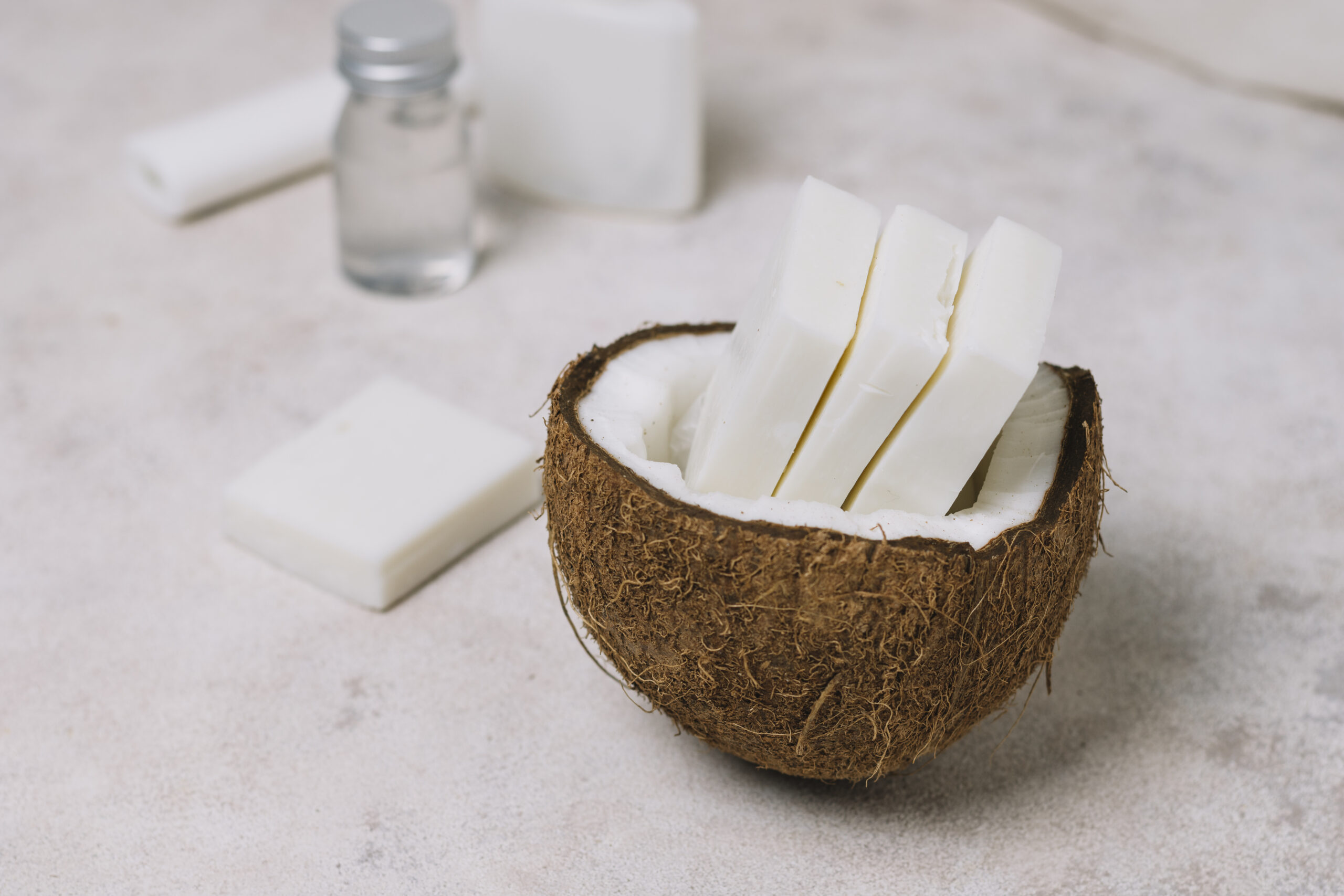Coconut oil has long been a staple in skincare routines due to its rich moisturizing properties and its ability to nourish and repair the skin. Homemade coconut oil soap combines all the benefits of this natural oil with the cleansing power of soap, making it an ideal choice for anyone looking to pamper their skin with gentle, nourishing ingredients. Whether you have dry, sensitive, or aging skin, coconut oil soap is perfect for keeping your skin hydrated, soft, and glowing. Plus, making it at home allows you to control the ingredients and ensure you’re using the best, natural products for your skin.
Benefits of Coconut Oil Soap
Coconut oil is packed with benefits for your skin, and when used in soap, it offers a number of unique advantages. Here are some of the main benefits of using coconut oil soap in your skincare routine:
- Deep Moisturization: Coconut oil is known for its ability to penetrate deep into the skin, providing long-lasting hydration. This makes it an excellent choice for individuals with dry or dehydrated skin.
- Antibacterial and Antifungal Properties: Coconut oil has natural antibacterial and antifungal properties, which can help cleanse the skin and prevent infections. It’s perfect for acne-prone skin or individuals with conditions like eczema or psoriasis.
- Rich in Antioxidants: Coconut oil is full of antioxidants, which help protect the skin from environmental stressors and free radicals. This can contribute to reducing the appearance of fine lines and wrinkles, keeping your skin youthful and healthy.
- Gentle on Sensitive Skin: Coconut oil is mild and soothing, making it a great option for people with sensitive or irritated skin. It helps calm inflammation and redness, leaving your skin feeling soft and smooth.
- Natural and Chemical-Free: By making your own coconut oil soap at home, you can ensure that it’s free from harsh chemicals, preservatives, and artificial fragrances. This allows you to create a natural, eco-friendly product that’s safe for both you and the environment.
Homemade coconut oil soap is perfect for anyone looking to add a natural, nourishing cleanser to their skincare routine. It’s easy to make and offers a wide range of skin benefits that leave your skin looking and feeling its best.
Step-by-Step Guide to Making Homemade Coconut Oil Soap
Making your own coconut oil soap is a simple process that requires just a few ingredients. Follow this step-by-step guide to create your own batch of luxurious, moisturizing soap.
What You’ll Need:
- Coconut Oil (Unrefined, virgin coconut oil is best for skincare)
- Lye (Sodium hydroxide — be sure to handle with care as lye can be caustic)
- Distilled Water
- Essential Oils (Optional, for fragrance — lavender, peppermint, or citrus are great options)
- Soap Molds (Silicone molds work best)
- Colorants or Additives (Optional, for color or texture — you can add dried flowers, oats, or even activated charcoal)
Step 1: Prepare the Lye Solution
First, carefully dissolve the lye in distilled water. Always add the lye to the water, never the other way around, to avoid a dangerous chemical reaction. Stir the mixture gently, and allow it to cool to around 100°F (38°C).
Step 2: Melt the Coconut Oil
While the lye solution is cooling, melt the coconut oil in a heat-safe container. You can do this on the stove using low heat or in the microwave in short intervals. Once fully melted, remove the coconut oil from heat and allow it to cool to the same temperature as the lye solution.
Step 3: Combine the Lye Solution and Coconut Oil
Once both the lye solution and coconut oil have cooled to around 100°F (38°C), slowly pour the lye solution into the melted coconut oil. Use a hand blender or stick blender to blend the mixture until it reaches a thick, pudding-like consistency. This process is called “trace,” and it ensures that the lye and oil have fully emulsified.
Step 4: Add Essential Oils (Optional)
At this point, you can add your chosen essential oils for fragrance. A few drops of lavender or peppermint oil can add a relaxing or refreshing scent to your soap. Mix the essential oils in thoroughly.
Step 5: Pour the Soap into Molds
Pour the soap mixture into your silicone molds. Use a spatula or spoon to level the top and make sure the soap is evenly distributed. If you want to add dried flowers, oats, or other additives, sprinkle them on top before the soap hardens.
Step 6: Allow the Soap to Cure
Let the soap sit in the molds for 24-48 hours until it hardens and becomes firm enough to remove. Once the soap has set, carefully remove it from the molds and cut it into bars if necessary.
Step 7: Cure the Soap
After you’ve removed the soap from the molds, it still needs to cure for 4-6 weeks. This allows the soap to fully harden and the lye to neutralize, making it safe for use. Store the soap in a cool, dry place while it cures.
Tips for Storing and Using Your Homemade Coconut Oil Soap
- Storage: Store your homemade coconut oil soap in a cool, dry place away from direct sunlight. If you’ve made several bars, wrap them in parchment paper or store them in an airtight container to keep them fresh.
- Use: Coconut oil soap can be used for both the face and body. Its rich moisturizing properties make it particularly beneficial for dry or cracked skin.
- Customization: Feel free to experiment with different additives or essential oils. You can add oatmeal for gentle exfoliation, or mix in dried herbs like chamomile for extra soothing benefits.
Conclusion
Homemade coconut oil soap is a nourishing and moisturizing solution that can transform your skincare routine. With its antibacterial, antioxidant, and moisturizing properties, coconut oil soap is perfect for dry, sensitive, or aging skin. By following this simple recipe, you can create your own luxurious soap that hydrates, soothes, and cleanses without any harsh chemicals. Whether you’re a beginner or an experienced soap maker, coconut oil soap is an easy and rewarding DIY project that provides lasting benefits for your skin.





